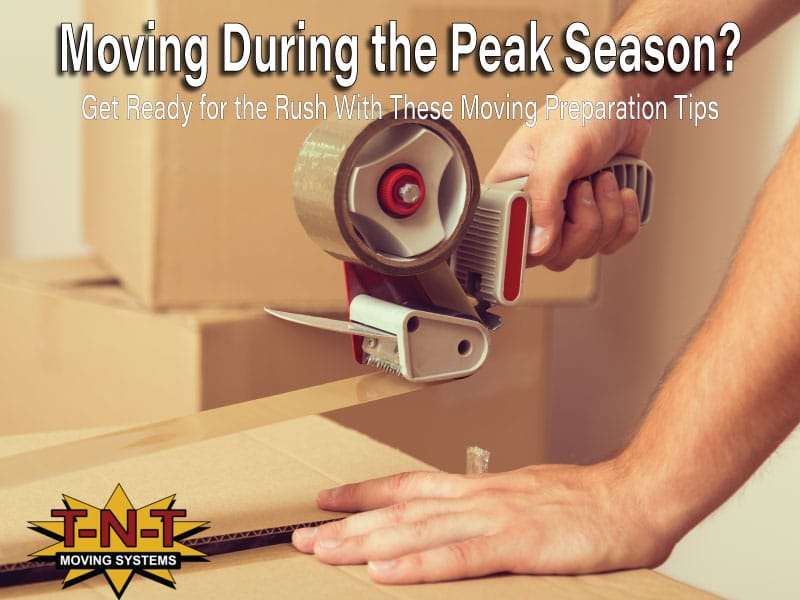Moving During the Peak Season? Get Ready for the Rush With These Moving Preparation Tips

We’re in the hottest months of the year, but it is still the most popular time to move homes. Among many other reasons, kids are out of school. And the demand for movers rises anytime school is out.
It’s always important to make thorough preparations when moving houses, but it’s downright crucial during the peak moving season. Not only is it the busiest time of year for movers, but the heat can make even the most minor mishaps frustrating! Let’s discuss some practical preparations to make your peak-season move a breeze.
What Is the Peak Moving Season?
In most areas of the country, the peak moving season starts in April and ends in September. More than 40 million people move homes annually in the United States, and about 80% of those relocations happen between April and September.
This is called “peak season” because it’s the busiest time of the year for movers. The most active months are typically June, July, and August. The demand for moving services is extremely high during this time, which is why it’s so important to plan ahead if possible.
Getting Key Decisions Out of the Way
Preparing for a move comes with a lot of decisions. You can make the entire process (and your life) much easier by knowing the answer to certain questions ahead of time. Learning what you need and making the necessary decisions now will reduce stress and help everything go smoother on moving day. Here are a few questions to ask yourself as you lay the groundwork for your relocation:
- What types of moving boxes and other supplies will I use?
- Will I rent a moving truck or hire a moving company?
- Am I planning to pack all my belongings myself or hire pros to handle it?
- Should I budget for moving insurance?
- Will I ship my car?
Start thinking about and answering these questions to give yourself plenty of time to prepare for your move.
Packing the Right Way
Packing is a crucial aspect of moving homes, and knowing how to pack your items correctly will save you a lot of trouble during the relocation. Let’s discuss a few ways to strategize your packing and prepare for your move.
Gather Your Supplies
Even if you score some free boxes from local businesses or individuals, you’ll most likely have to create a budget for moving supplies. Those supplies can get expensive, so you’ll want to ensure you don’t buy anything you don’t need.
Take inventory of all the belongings you’re moving to the new home or into storage, so you know precisely how many of each size and shape of boxes to purchase. Learn how to wrap and pack fragile items, as well as any food you’re taking. You also may want to snap photos of your entertainment system and other electronics before breaking them down. And don’t forget to label your boxes so you know exactly what’s in them.
Pare Down Your Belongings
Most of us have things in our homes that we don’t really need in order to maintain our current living standards. Take time to purge your belongings and make a pile for anything you no longer need or want. You can donate gently used items or sell them and put the proceeds toward your moving budget.
Pack in Stages
Hopefully, you’re planning ahead and not relocating in a hurry. If that’s the case, you have time to pack your belongings in stages.
Organizing your off-season clothes and other items you rarely use is a great place to start. And you can work your way to essential items you’ll be using up until moving day. These items include anything you need handy as you move and settle into your new home.
Connect With Professional Movers
The prospect of researching and interviewing multiple moving companies before locking in dates for your relocation may seem intimidating. But the process is nothing compared to the stress you will feel if you wait until the last minute to contact movers. Further, attempting a DIY move when it’s simply too big or long-distance can make things even worse.
TNT Moving Systems specializes in small, big, short, and long-distance moves and everything between. Give us a call or request a free quote today!
Handling the Pre-Move Details
You have more than your fair share of tasks to complete on your to-do list, and remembering the details is essential when preparing for your move. Don’t forget to take these steps:
Call Your Friends
You might need a friend or two to help you with your move, even if you’re using professional movers. And if you’re going to the DIY route, you’ll need a few more. Remember to give your friends and relatives plenty of notice so they have time to plan around your move day. And request time off work for the move date as soon as possible.
Update Your Address
We all know the problems that can come with forwarding your mail. But the truth is it’s an unavoidable part of moving homes. Notify the USPS of your change of address at least two weeks before your move date, and update your address with your banks, credit card companies, subscriptions, and anyone else who needs to know.
This is also a great time to update your driver’s license and voter registration information. And if you can think of any other administrative tasks, knock them out now so you don’t have to think about them later!
Transfer Your Utilities
You don’t want to get everything moved into your new home only to realize that none of your utilities are set up. Transfer or establish utilities in your new house at least a week before the move. Your primary concerns will be having access to water, gas, and electricity. But you don’t want to forget about the Internet and TV services.
Get a Moving Permit
Find out if your new neighborhood requires moving permits. If so, order your permit at least two weeks before the move date so you have it. That said, you’ll want to get things going much sooner if you plan to ship your car. Try to make arrangements with a shipping company and adjust your budget at least a month before moving day.
Tie Up Loose Ends
Take a morning or afternoon to reflect on this new chapter in your life. Think about what you’re leaving behind, and list any loose ends you need to tie up.
For example, do you have any clothes to pick up from the dry cleaner or books to get back from a friend? Have you canceled your gym membership and transferred your prescriptions to a pharmacy in the new neighborhood? The closer you get to the move date, the more hectic your days will become. Don’t leave yourself even more things to do when the big day arrives.
Saying Goodbye to Your Old Home
It’s easy to get wrapped up in thoughts of life in your new home when preparing to move. But there are a few things to take care of before leaving your old house.
Talk to Your Landlord
Most landlords contact you throughout the year to confirm that you are renewing your lease. But when your move is coming up in a month or two, it’s best to be proactive and provide notice to your landlord.
Make sure your landlord knows your plans at least 30 to 60 days prior to the move date. While you’re at it, ask them if there are any specific things you can do to ensure you get your security deposit back!
Hit All Your Favorite Local Spots
Nostalgia can get the best of us. Sure, you’re excited to be changing neighborhoods and starting a new chapter. But taking time to say goodbye to your old neighborhood can provide you with much-needed closure.
If possible, eat a meal at one or two of your favorite restaurants in the area. Grab an espresso at the local coffee shop. And spend an afternoon strolling through the neighborhood one last time.
Cancel Trash Pickup
If you don’t live in a city that provides free trash and recycling pickup, cancel your service before moving. You don’t want to get hit with a bill for something you’re not using.
Deep Clean Every Space
It’s best practice to clean your old home before leaving. Not only does it leave a good impression on your landlord and new residents, but it also increases your chances of getting back that security deposit. Oh — and it’s the right thing to do!
Carve out a weekend to deep clean every room and space of the house. Go room by room, wiping down every surface from the ceiling to the floor. Also, look for any minor repairs you can tackle, such as filling holes in the drywall or touching up paint where it’s needed.
This is also an excellent time to begin defrosting your freezer and refrigerator if you’re taking them with you. Otherwise, you could be dealing with a wet moving truck and damaged items.
Do a Final Walkthrough
You’ve removed all your items and cleaned every space of the home. Now, it’s time to do a final walk-through to see if you’ve overlooked any nooks or crannies. Be sure to go through the attic and garage, and snap photos of the home’s move-out condition for documentation of how you’re leaving it. It can also help to double-check everything with your landlord.
Get Your New Home Ready
Finally, it’s time to start preparing your new home. Here are a few items to check off of your to-do list that will help your new house instantly feel like home:
Tackle Basic Home Improvements
If possible, try to get into your new house before the move date to handle any minor repairs necessary for you to live there comfortably. Even if you can’t visit the property before moving in, speak with the realtor and evaluate photos to develop a repair strategy for the first few weeks in a new home.
Go Shopping
There’s no better time to upgrade your home goods than when you’re moving. As you’re planning for repairs and improvements, do some online shopping for furniture and decor that will optimize your living experience.
Maybe it’s time to invest in a new mattress or sofa. Perhaps you’re not crazy about the floors or light fixtures in the new house. Start shopping as early as possible so you have time to find good deals.
Explore the Neighborhood
The first few weeks of your relocation are vital for getting to know your new area. Consider ordering takeout for the first few nights after the move; along with allowing you to try out local restaurants, this can make things less stressful as you unpack and organize your home. Also, walk around the neighborhood to meet your new neighbors, see what local businesses you might frequent, and arrange a housewarming party.
Wrapping Up
If this is the best time of year for your family to move, be sure to plan accordingly. The better prepared you are, the better you’ll be able to handle the heat!
Keep the tips above in mind as you develop a relocation plan and knock out the tasks on your to-do list. And remember to contact TNT moving systems as soon as possible to lock in your move dates!




